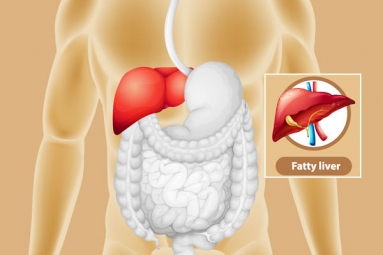
(Image source from: Canva.com)
Numerous elements beyond alcohol can adversely affect liver health. Although alcohol is widely recognized as a harmful substance for the liver, other contributors, such as inadequate nutrition, viral infections, various medications, and pollutants in the environment, can also result in liver harm. These influences may trigger issues like non-alcoholic fatty liver disease (NAFLD), hepatitis, fibrosis, or potentially cirrhosis. The liver is essential for detoxifying the body, aiding in metabolic processes, and storing nutrients. Continuous exposure to detrimental substances or unhealthy habits can burden the organ, hinder its functioning, and pave the way for chronic liver ailments. Continue reading to explore the elements that can deteriorate your liver health.
Excess sugar consumption: A high intake of sugar, especially fructose present in sugary drinks and processed items, can result in fat build-up within the liver. This condition can lead to non-alcoholic fatty liver disease (NAFLD), which progressively inflames and injures liver cells, resembling the effects seen in alcohol-related liver conditions.
Obesity and lack of physical activity: Carrying extra weight, particularly around the waist, promotes insulin resistance and fat accumulation in the liver. Obesity is a significant risk factor for NAFLD, and in the absence of regular exercise, the liver finds it difficult to metabolize fats, which can lead to inflammation and scarring.
Excessive medication use: A variety of both over-the-counter and prescribed medications, like acetaminophen, statins, and specific antibiotics, can harm the liver when taken in large quantities or for extended periods. Since the liver processes most medications, their misuse or excessive use can put stress on and damage liver tissues.
Viral infections: Hepatitis viruses attack liver cells directly, resulting in inflammation and cell death, which can escalate to cirrhosis or liver cancer in severe instances. Chronic infections may remain asymptomatic for a long time, but they can gradually compromise liver function if not addressed.
Exposure to environmental toxins: Substances such as pesticides, industrial chemicals, and heavy metals, including mercury and lead, can infiltrate the body through contaminated food and water, accumulating in the liver. These harmful agents disrupt liver enzymes and can cause cellular damage, particularly with prolonged exposure.
Smoking: The smoke from cigarettes comprises hazardous substances that adversely affect not only the lungs but also travel to the liver through the bloodstream. This habit heightens oxidative stress and inflammation within the liver, aggravating pre-existing liver issues and complicating the detoxification process.
Sleep deprivation: Insufficient sleep disturbs the body’s circadian rhythm, which influences liver metabolism and detoxification. Ongoing sleep shortages are associated with a higher fat accumulation in the liver and compromised glucose metabolism, which elevates the risk of developing fatty liver disease.
High intake of processed foods: Foods that are heavily processed typically contain a high amount of trans fats, refined carbohydrates, and synthetic additives. These ingredients contribute to fat accumulation, increased oxidative stress, and inflammation in liver cells, thereby raising the risk of metabolic liver diseases.
Dehydration: Adequate hydration is crucial for the elimination of toxins from the body. Persistent dehydration hampers the liver’s capacity to efficiently detoxify, leading to challenges in breaking down and removing waste products, which may result in the accumulation of harmful substances.
Nutrient deficiencies: A diet lacking essential nutrients such as choline, omega-3 fatty acids, and antioxidants can impair liver function. For example, insufficient choline intake is correlated with fat buildup in the liver, while a deficit in antioxidants like vitamin E may increase the liver's susceptibility to oxidative harm.
By being aware of these factors, you can better support your liver's health.













